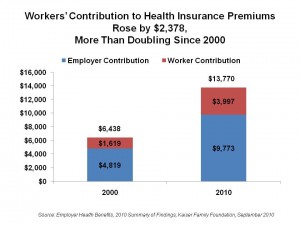 Since 2000, American workers’ contributions to health insurance premiums more than doubled, to nearly $4,000 a year from $1,619 ten years earlier. The total premium going to health insurance per worker for family coverage is $13,770 in 2010, with nearly $10,000 being borne by the employer.
Since 2000, American workers’ contributions to health insurance premiums more than doubled, to nearly $4,000 a year from $1,619 ten years earlier. The total premium going to health insurance per worker for family coverage is $13,770 in 2010, with nearly $10,000 being borne by the employer.
Workers’ share of premium increased 147%, and employers’ grew 114%.
The Kaiser Family Foundation/Health Research & Educational Trust’s (KFF/HRET) annual 2010 Employer Health Benefits survey tells the story of health insurance costs that continue to grow, the rates of which depend on the type of health insurance purchased. For example, workers in high-deductible health plans saw their cost of coverage increase between 8-13% between 2009-10.
Another growth trend that will continue is employers’ levying greater cost-sharing for health onto employees. KFF notes that, in a tight labor market in a recession, employees can’t simply vote with their feet by seeking employment, and better benefits, elsewhere. This year, 38% of large firms (with over 200 employees) reduced the scope of benefits or increased cost-sharing. 36% of large employers increased workers’ share of premium, up from 22% in 2009.
KFF conducted this survey by telephone among 2,046 public and private employers with 3 or more workers. Polling was conducted between January and May 2010 among firms providing health insurance as a benefit to any employees.
Health Populi’s Hot Points: The cost of health premiums vary throughout the U.S. and by type of firm: 20% of covered workers are in plans with annual total premiums for family cover of over $16,524. On average, covered workers pay 30% of the family premium, up from 27% in 2009. On average, workers paid $3,997 for family coverage, up from $3,515 in 2009.
In Health Populi on August 19, 2010, we discussed the expected 9% increase in health costs expected by the National Business Group on Health in 2011. It is also expected that even more costs will be borne by employees. In a stagnant job and salary market, how will employees living paycheck to paycheck fare in this scenario? Some will forego necessary care, postponing meeting the high-deductibles they have signed on for.
Deloitte’s recent survey of 4,000 U.S. consumers in January-February 2010 found that 1 in 5 Americans postponed health care, and 40% did so because of cost.
There’s an even more dramatic statistic in the KFF survey from March 2010 which found that over 1 in 2 American adults has self-rationed health care in the past year. Adjust your plans according, those who market goods and services in health: people aren’t always Rational Economic Men and Women when it comes to spending on health.




 Thank you,
Thank you,  As a proud Big Ten alum, I'm thrilled to be invited to meet with the OSU HSMP Alumni Society to share perspectives on health care innovation.
As a proud Big Ten alum, I'm thrilled to be invited to meet with the OSU HSMP Alumni Society to share perspectives on health care innovation. I was invited to be a Judge for the upcoming CES 2025 Innovation Awards in the category of digital health and connected fitness. So grateful to be part of this annual effort to identify the best in consumer-facing health solutions for self-care, condition management, and family well-being. Thank you, CTA!
I was invited to be a Judge for the upcoming CES 2025 Innovation Awards in the category of digital health and connected fitness. So grateful to be part of this annual effort to identify the best in consumer-facing health solutions for self-care, condition management, and family well-being. Thank you, CTA!